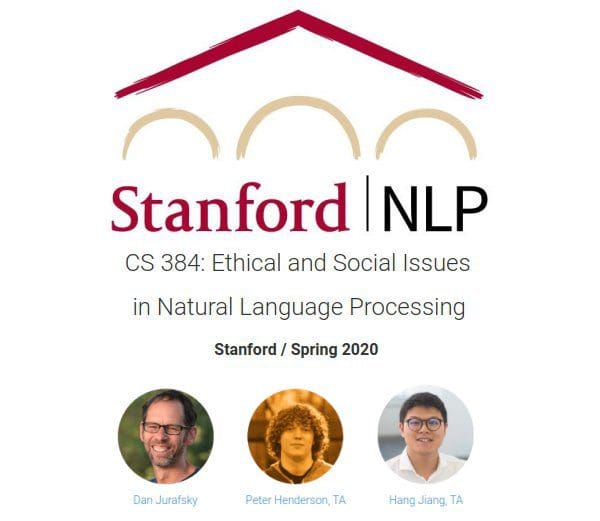Free From Stanford: Ethical and Social Issues in Natural Language Processing
Perhaps it's time to take a look at this relatively new offering from Stanford, Ethical and Social Issues in Natural Language Processing (CS384), an advanced seminar course covering ethical and social issues in NLP.
Maybe you have dipped your toe in the waters of natural language processing by auditing Stanford's From Languages to Information course. Perhaps you have used the course material from Stanford's Natural Language Processing with Deep Learning to hone this additional particular set of skills. You may have learned from one of these many other freely-available top-notch natural language processing courses.
If you have previously toured some of these other courses, perhaps it's time to take a look at this relatively new offering from Stanford, Ethical and Social Issues in Natural Language Processing (CS384), an advanced seminar course covering "issues in natural language processing related to ethical and social issues and the overall impact of these algorithms on people and society."

Like a number of other Stanford CS courses (including those mentioned above), the learning materials for this course — including a few class slides, but mostly an impressive collection of relevant academic papers (sadly, videos for this course are not publicly available) — are freely-available to anyone interested in using them. Taught by professor Dan Jurafsky, along with teaching assistants Peter Henderson and Hang Jiang, one can expect the following from the course (taken directly from the course's website):
Topics include: bias in NLP data and models, privacy and computational profiling, measuring civility and toxicity online, computational propaganda, manipulation and framing, fairness/equity, power, and various applications to social good. We've drawn heavily on related classes like Yulia Tsvetkov and Alan Black's Computational Ethics for NLP and Emily Bender's Ethics in NLP.
Rather cleverly, the class schedule's individual weeks are classified as either covering "ways to avoid ethical or social problems in doing NLP research," which are coded as "red weeks" signifying that "(NLP Should) Do No Harm," or covering "ways to apply NLP to help solve social or ethical problems," or "blue weeks" expressing that "(NLP Should) Do Good."
Broad weekly topics, supported by the aforementioned comprehensive collection of academic papers on the subjects, include:
- Gender Bias in NLP Models and Data
- Racial Bias or Disparity in NLP Models
- NLP as a tool for detecting stereotypes or bias
- NLP for identifying toxicity/hate/abuse
- NLP for Studying Propaganda and Political Misinformation
- NLP for Fact-Checking/Fake News Detection
- NLP for Studying Framing and its Biases

This does not cover all of the subjects either, and lessons and reading materials are incredibly up to date. For example, there is a section on "Issues in NLP related to COVID," which is obviously a timely and bleeding edge theme.
Given the importance of ethics and social issues to so much of what data science and machine learning touches, and relatedly (and by extension) natural language processing, a course like this one should be perceived by all as being on equal footing as courses which transmit the technical know-how needed to practice and perform research in these areas. Numerous resources, including books and other courses, are now raising ethics and social issues to equal status, but devoted courses such as Stanford's Ethical and Social Issues in Natural Language Processing (CS384) are worthy of independent study.
Do yourself a favor and have a look at the material freely-available in this course's materials. You will either have your current understanding of such an important array of topics reinforced, or you will be startled at the vast concerns you have overlooked to this point. Either way, the result will be your takeaway of some additional knowledge on genuinely pressing and far-reaching issues.
Related:
- The Best NLP with Deep Learning Course is Free
- From Languages to Information: Another Great NLP Course from Stanford
- 10 Free Top Notch Natural Language Processing Courses
